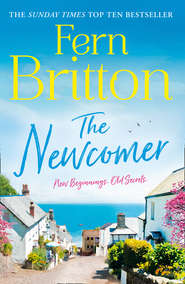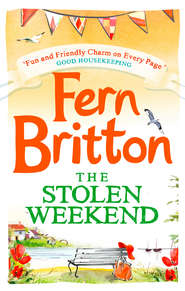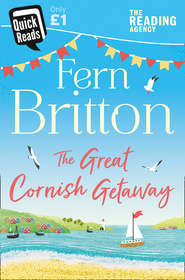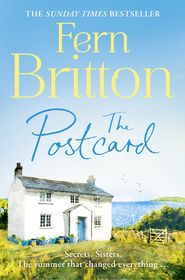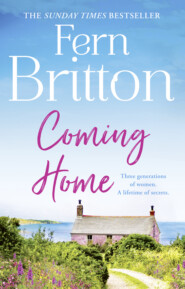По всем вопросам обращайтесь на: info@litportal.ru
(©) 2003-2024.
✖
New Beginnings
Автор
Год написания книги
2018
Настройки чтения
Размер шрифта
Высота строк
Поля
She had noticed one of the lace curtains in the bay windows move, and knew her mother would open the door at any moment. Not wanting to miss the train by getting caught up in conversation or complaint, she waited till her mother appeared on the doorstep then, as the children waved at her, she locked the car and shouted, ‘Can’t stop, Mum. I’m going to be late. Wish me luck. I’ll see you tomorrow and thanks a million.’
Then, with a wave, she started walking briskly towards the station. As her steps took her further away from her mother’s, she couldn’t help thinking back to a time when she thought she’d never be able to move on.
The hours and days after Nick’s death were wiped from her mind. Christie was visited by waking dreams of him. When the phone rang, it must be him. When the doorbell rang, it must be him. But, of course, it never was, and the blow to her solar plexus felled her more painfully each time. The agony of telling people that she was no longer part of ‘NickandChristie’ was something she began to avoid. The look in their eyes, the sound of their voices on the phone made anger roar into her brain and scorch the backs of her eyeballs. Instead, she asked Mel to tell everyone they knew.
One morning a postman delivered two letters for Nick. She heard them drop through the letterbox and just managed to open the door and give the innocent man an earful of grief-sodden abuse before he disappeared through the gate. She sagged onto the doorstep. As she wept, she seemed to float outside her body and, looking down on herself, she was filled with compassion and disgust by what she saw.
‘Get up, you stupid excuse for a woman. Get up! Comb your hair, get dressed, brush your teeth. Be a credit to Nick. Nick, you bastard!’
She only emerged from this altered state when a small hand smoothed her hair and a little boy’s voice said, ‘Mummy, I’m hungry.’
The words lasered through her. Yes. She was literally the breadwinner now, the one to put food in the children’s mouths, to clothe them and guide them through life. She had to be both mother and father to them from now on.
The protective shell that had enveloped her that day kept her strong as she organised the funeral. Her mother tried to help with the catering. ‘You must have everybody back to the house and feed them, Christine. That’s what I did for your father and it’s what people expect. I suggest sandwiches, nothing too fancy. A big bowl of cocktail sausages always goes down well. What man doesn’t like a sausage? That’s what your father always said. And what about drink? Just a little sherry and lots of tea, I think. You don’t want anybody getting drunk. And make sure they know when it finishes. If people hang about they’ll expect more food. Christine? Christine? Christine?’
But Christie had gone. She couldn’t take her mother’s wittering any longer so she had opened the front door and just walked out. For a brief moment in her life she wanted to be free of responsibility. No more widow, no more mum. Just Christie.
Her escape didn’t last long – half an hour at most – and when she got home, the children were in the middle of supper, eating chicken nuggets at the kitchen table. Maureen was at the sink, making a jug of Ribena. Christie went to her and hugged her. ‘Thanks, Mum.’
‘That’s all right, darling.’
And nothing more was said.
Somehow the funeral drew a line through the chaos of the days preceding it, and gradually Christie’s life began to take on a rhythm of sorts. Not the same as before, but almost bearable. Now that she was solely responsible for the children and could think of nothing else, she gave in her notice at MarketForce and devoted herself to them, so money was tight. When Libby and Fred were settled, she would start working as a journalist again. The one thing hanging over her head was the bank loan Nick had taken out to help his father, not long before he died. The debt was part of his legacy to her. She had promised him that she would never tell Maureen about its existence, and there was no way she would tell her now.
Chapter 2
Deep breathing was not producing the desired effect. Christie’s heart was still racing as fast as if she’d been rigged up to an intravenous caffeine drip. Her palms were clammy and she knew that if she unclenched her fists her hands would be shaking. She inhaled again slowly, trying to focus her thoughts. Catching sight of herself, she immediately wished she’d stuck with the simple black round-necked dress, her original choice, instead of giving in to her fashionista sister. After last night’s couple of glasses of wine, Mel had insisted she went for something more ‘out there’.
‘Chris! I’m not going to allow you to disappear into the scenery . . . as normal. This is your big chance, the one time when you want people to notice you, and you’re dressing in your usual widow’s weeds. Try this.’
She held out a funky, figure-hugging aquamarine and yellow silk sheath dress, which they both knew Christie would never wear in a million years. The neck, hemline and lack of sleeves meant there was way too much on show. Only two years younger, Mel had always been the risk-taker, edgier, unafraid of others’ opinions, and her dress sense reflected that. She had been the highest-marked student of the year when she graduated from the London College of Fashion and was now making a name for herself as a freelance stylist for the glossy mags. Although the sisters were the same size, there was little in their separate wardrobes that would happily cross over. In any case, Christie wasn’t sure she wanted people to notice her because of what she wore.
In the end, they had settled on a compromise, dug from the back of the wardrobe: a maroon wrap dress that reached to just above her knees and whispered, ‘Look at me. I’m sexy and smart.’ Even Mel didn’t know how this piece of good taste had got into her wardrobe, but they’d agreed that, zhooshed up with very sheer tights, a simple but gorgeous necklace and some killer heels, this was the look that was just right for Christie and for the show.
However, now, standing at the side of the studio, surrounded by the controlled chaos of cameramen, runners, researchers, editor, producer and the other presenters, Christie suddenly felt less confident. Instead of distracting attention from her modest bosom, the large milky amber pendant they’d chosen seemed to accentuate it. To fill out what now seemed an inappropriately skimpy neckline, she needed the breasts of Sharon Barber, the bosomy ex-soap star and Tart Talk regular who was standing a few feet away, chatting to the floor manager. Christie pulled at the jersey fabric, trying to close the V, then reminded herself of how the girls in Makeup had complimented her. Under those super-bright lights, her reflection was of someone she hardly recognised. Instead of the usual dressed-down mother of two, she saw someone elegant but not intimidating, well-groomed but not over the top. They’d given her a bit more eye-shadow and lip-gloss than she was used to and her hair was bigger and more flicked out, but she had to admit that, against her expectations, she quite liked the new her. She took another deep breath.
She felt a hand on her arm and turned to see Marina French smiling at her. An experienced news reporter, now deemed too old for the mainstream news, Marina was respected for her popularity and her ballsy attitude to life, which made male presenters quail. She was still the anchor of Tart Talk because of the much-needed gravitas she lent to the otherwise unpredictable fast-talking show. ‘Christie, don’t worry. You’ll be fine,’ she murmured, as she nodded towards the audience. ‘They’ve come to have a good time. They want to like you.’
Christie nodded and swallowed. ‘Hmm. If you say so . . .’
‘Every guest presenter feels nervous their first time on live TV. I’d be worried if you weren’t. But once you’re out there, the time’ll whizz by. Try to enjoy it. You’ll soon be an old hand.’
‘I hope so.’ And she truly did. However nerve-racking the experience so far, she was feeling an excitement that she hadn’t known in years. Last week’s phone call from the show’s producer had come at exactly the right moment. She had read and loved the one-off piece Christie had written about Nick’s death, her enforced single motherhood and subsequent move to the country.
After two years, Christie had at last found she was able to look back and understand that she should celebrate the time she had been given with Nick. As the children grew older, she was even beginning to enjoy being single again as she gained a new perspective on her life. When she had said as much to her editor at a drinks party, he had immediately reacted: ‘I’ve never heard you talk like that. You must write about it for me.’ So she had. She had poured her emotions into the piece, excited to be exploring something so close to her heart, such a welcome change from the usual consumer-based features that had become her stock-in-trade. When her editor had criticised it as ‘too cerebral for our market’, and asked, ‘Where’s the sex?’ she had almost despaired.
To be asked to come on Tart Talk to talk intelligently about women surviving the loss of the love of their lives was a huge compliment. But today she was feeling rather differently. She had been up since five thirty, unable to sleep, not even in the back of the sleek Mercedes sent to take her to the TV7 building, home of Tart Talk, as it crawled through traffic held up by roadworks on the Euston Road. Sitting on the uncomfortable leather sofa in her dressing room, leafing through the pile of the day’s papers as she waited to be called to Makeup, there had been plenty more time for the nerves to kick in. She had been thankful when a runner finally took her along to the green room to meet the three regular presenters.
She had immediately sensed the great rapport that existed between Marina, Sharon and Grace: Grace Benjamin – the thin, gap-toothed black comedian with a big laugh, whose bisexuality was often the butt of her own jokes. Their camaraderie meant they had welcomed her without reserve, offering her coffee before they went through with the producer the subjects they might be going to cover on today’s show. How much would Christie be able to contribute to a discussion about middle-age binge drinking and subsequent one-night stands? Staying up late to watch Newsnight just in case had been a complete waste of time. She’d have to wing it and focus her efforts on the reason she was there.
Just before they were due to go on, a fourth woman had sashayed in, finishing a conversation on her BlackBerry. Tall and well-padded but dressed in a stylish tailored cream suit, not a hair out of its coiffured place, she sat down beside Marina. ‘Hello, darling,’ she breathed. ‘I was in the studios so thought I’d pop down and see how you were.’ Her energy and presence immediately refocused the room so all eyes were on her. Christie was wondering where she’d seen her before when Marina introduced her.
‘Julia, you must meet Christie Lynch. Remember she used to be on MarketForce? She’s going to be talking about bereavement on the show today. Christie, this is my very special agent, Julia Keen.’
Christie immediately knew who she was. Julia Keen was one of the talent agents in London, a name known to most magazine readers, loved and feared in equal measure by those in the business. She had made her reputation by poaching high-earning clients from other agents, often appearing with them at all the most prestigious showbiz events. Christie had read one or two profiles about her in the press. About a year ago Julia had been the subject of much media interest when one of her clients, the TV presenter Ben Chapman, had drowned in her indoor swimming-pool: coroner’s verdict, misadventure. But the press had been free and frequent with speculation about their relationship and the real reason for Ben having been there without his girlfriend, as well as about what had really happened. He had been the co-host of Good Evening Britain, a news/magazine show that had actors, writers and MPs queuing up to appear. Newsnight meets The One Show, it had the six to seven p.m. slot on TV7 five nights a week. When Ben died, his on-air partner, Gilly Lancaster, had made a tribute to him so moving that it was printed on every red-top front page the following day. His long-term partner, Laura, was devastated at losing him, while Julia had absented herself from the red carpets and all that went with them. Success breeds success but scandal can be a dangerous enemy.
Christie remembered the photos splashed in the press of Ben, Laura and Julia, as well as of an indoor pool that had come straight from a scene out of Footballers’ Wives: colonnaded french windows leading back into the house, white loungers, tropical ferns in large ceramic pots. Julia clearly knew how to enjoy the fruits of her success. Smiling, Christie offered her hand – to find it gripped firmly, as Julia’s clear blue eyes assessed her in an unnerving and not altogether pleasant way.
‘A pleasure to meet you,’ Julia said. ‘I’ve read your Daily News column. Good luck today.’ She gave her another look of appraisal.
‘Thanks.’ Christie, feeling a little uncomfortable, was relieved when, at that moment, the green room door opened and they were called to the studio.
As she stood in the dark, behind the set, she could hear the large audience of students and pensioners filing in. Who else had time to go to a daytime show? Bussed in for the occasion, they found their seats and the buzz subsided as the warm-up man welcomed them. Christie strained to hear what he was saying.
Then someone else caught her attention.
‘Christie, my darling. Hi. I’m Tim, the floor manager.’ A young casually dressed man wearing headphones was at her side. ‘Welcome. Nice to have you. In two minutes, watch Marina and just follow her onto the set and take the second stool on the left, behind the desk. OK, love? Good luck.’ He patted her shoulder in encouragement.
Oh, God, Marina was walking onto the set. They want to like me, Christie repeated to herself, and followed, as confidently as she could, to the sound of applause. Why did I say yes to this? She could feel the heat of the lights on her face and a prickle of perspiration on her back as she went out into the bright lights. She hitched herself onto the stool, which was high enough to make the women sit up straight or fall off, and wondered what to do with her heels: let them hang or tuck them in? She tucked them in and pulled down the sides of her skirt.
‘Look as if you’re enjoying yourself,’ whispered Grace. ’They won’t eat you.’
Switching on a smile as the warm-up guy introduced the team, Christie looked up and out towards the audience where her eyes fell on Mel in the second row, resplendent in a to-be-noticed-by-my-sister neon pink scarf, grinning like a maniac and giving her the thumbs-up. If only Nick could have been there with her. He would have been so proud. She twisted her wedding ring round her finger, then swiftly reminded herself that she had to stop thinking like that. This was her life now.
‘OK. Fifteen seconds, studio. Quiet, please,’ shouted Tim. He continued the countdown to zero, then the show’s title music struck up.
As the cameras began to roll, they were all laughing. It was up to the four of them now. Christie heard a disembodied voice introducing Marina, Grace, Sharon, and then: ‘. . . and please welcome Christie Lynch, the merry widow, to ask her: is there dating after death?’
Oh, God! No! Why had no one briefed her that they weren’t going to be taking the sensitive, dignified approach she had imagined? Because they realised she’d have shied away? Of course. She should have known better than to trust them not to trivialise the subject, but it was too late now. In front of the audience and her co-presenters, she had no choice but to keep smiling and try to think of something to say. Come on, Nick. Give me strength.
Chapter 3
Before she knew where she was, the show was over. Mel had kissed her, said how brilliant she had been and disappeared off for a shoot with John Swannell, her favourite fashion photographer. Christie had climbed down from her stool and was taken to the green room, where she found all her belongings had been brought from the dressing room.
The entire programme team was there, enjoying sandwiches and a glass of wine. While Marina was sharing a joke with Sharon, Julia Keen discreetly engineered a conversation alone with Christie, lowering her voice almost to a whisper, as she said, ‘You were good, darling. Much better than I expected. Now, do you have a good agent?’
Taken aback by Julia’s directness as well as the apparent need for discretion, Christie, suddenly self-conscious, muttered, ‘No. I’ve never really needed one.’
Julia’s eyes seemed to light up from within. ‘I think things are about to change for you. Perhaps we should have a little talk some time. Take my card.’ She extracted one from a small silver holder and slipped it into Christie’s hand. ‘Just call me,’ she said, giving Christie’s arm a little squeeze just above the elbow. Then she turned to join the other women and, within moments, was laughing as if she’d been with them for the length of the joke.
Christie stared at her, watching how she stayed for just as long as was necessary before making her excuses. She realised this was her cue to leave too. She said her goodbyes, receiving polite and not unenthusiastic thanks from the producer. She left the building carrying a hand-tied bunch of Heavenly Scent flowers, a Diptyque candle and a card from the regular presenters thanking her. She had pretended not to see the producer hurriedly signing on their behalf when she’d thought no one was looking. The card that Julia Keen had given her was burning a hole in her pocket.
*
Not until Christie sank into the grey-leather back seat of her chauffeur-driven Mercedes and she was watching the black ribbon of the M40 disappear beneath them, did she stop to take stock. Only then did she realise that she had no idea what she’d said at any time over the past hour or so, or if any of it had made sense. Her brief conversation with Julia had taken on the quality of a dream. She dismissed it as an aberration. The woman had only said what she felt she had to. Hadn’t she?
The driver had been asked to drop her off at her mother’s where she’d left her car. There was just time to drop in before she went home to meet the children when they got back from school. The door chimes pealed, and through the dimpled glass, she saw the distorted silhouette of her most ferocious critic coming towards her. The door opened to reveal Maureen, slim, her streaked blonde bob as aspirationally gamine as ever, beady eyes darting this way and that, thin mouth stretched into a smile, a hand on the string of pearls that crowned her heather twinset.






